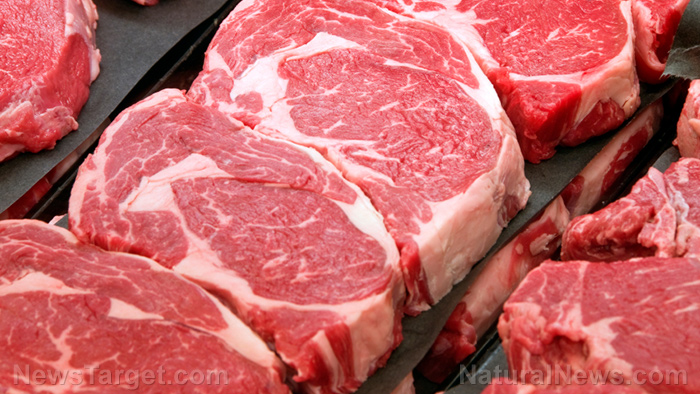
The shortage has also caused prices for beef and pork to jump by more than 20 percent, even after President Donald Trump's historic order to keep the plants running during the pandemic. These challenges underscore just how difficult it is to quickly fix America's broken meat supply chain.
Infections growing at meat plants
Meat processing plants across America's heartland have become coronavirus hotspots as the disease spreads quickly among employees. These workers report in the thousands each day to work in packed conditions in production lines moving at breakneck speed.
On Tuesday, the Iowa Department of Public Health reported massive coronavirus outbreaks at several large meat processing plants in the state. A Tyson Foods plant in Perry had 730 positive cases, representing 58 percent of its workforce. In Waterloo, another Tyson plant reported 444 cases, 17 percent of employees. Meanwhile, National Beef's Iowa Premium plant in Tama has 258 cases, 39 percent of employees. (Related: Almost 900 workers test positive for coronavirus at Tyson's meatpacking plant in Indiana.)
The decrease in production has led analysts and experts to warn against expecting a quick rebound in supply, even as Trump signed the order keeping the plants open last week. Agricultural lender CoBank has predicted that meat supplies for retail grocery stores could shrink by almost 30 percent by Memorial Day. This would lead to an increase in the retail price of pork and beef by as much as 20 percent relative to what they were last year. Shake Shack executives have also warned investors to expect much higher beef prices.
Across the nation, grocers such as Kroger and Costco Wholesale have started rationing supplies. Meanwhile, fast-food chain Wendy's has dropped some burgers from its menu. On Tuesday, Iowa-based Hy-Vee became the latest grocery to put limits on meat purchases.
America's meat production is concentrated in the hands of a few companies that rely largely on massive regional processing facilities where staff work in close quarters. For bottlenecks to ease and supply to rebound, these factories need to come back at full speed -- a daunting task, given the need to increase safety measures against the coronavirus on top of a significant amount of employee absenteeism.
Consolidation has made it worse
The root of the problem lies in the decades of consolidation that have gone on in the industry. About two-thirds of America's beef industry is controlled by Tyson Foods and its top two rivals, JBS SA and Cargill. As a result, the bulk of America's beef gets processed in a few dozen giant plants. Chicken and pork are similarly dominated.
Recently, Senators Tammy Baldwin of Wisconsin and Josh Hawley of Missouri have asked the Federal Trade Commission (FTC) to investigate the consolidation of the American meat processing industry for any anticompetitive behavior. In their letter to the FTC, the senators stated that the consolidation has “undermined the stability of America's meat supply and become an issue of national security.”
In the letter, the senators addressed the disruptions to the industry's supply chain caused by the coronavirus pandemic.
“As a result, farmers cannot process their livestock -- which are costly to maintain -- and consumers risk seeing shortages at grocery stores, exacerbating the food insecurity that all too many Americans are currently experiencing,” the senators wrote. “These harms might have been mitigated if the meatpacking industry was less concentrated.”
While retail prices of meat have surged, the prices of cattle and hogs have remained low as supply outstrips demand. Farmers are unable to sell their animals with slaughterhouses closed and meat processing facilities not running at full steam. Some hog producers have even been forced to cull their herds.
While the President's order could help stem the tide of additional meat plant closures, the problem of staffing these plants in the face of coronavirus infections remains. “Attracting workers to fill the thousands of vacant positions at meat plants across the U.S. is still an issue,” stated Will Sawyer, CoBank animal-protein economist, in a report.
“As communities reopen with only about one week of meat supply in cold storage, shortages and stock outs in the meat case couldn’t come at a worse time,” Sawyer said. “Food inflation and a weak U.S. economy is a combination that will leave many consumers in greater financial strain.”
Read FoodSupply.news for more breaking news about the state of the US food supply.
Sources include:
Please contact us for more information.























